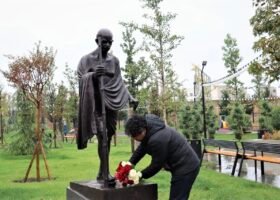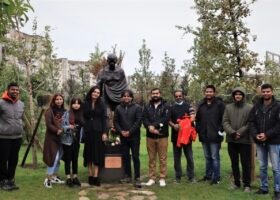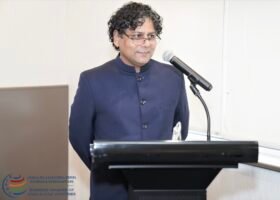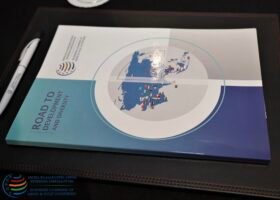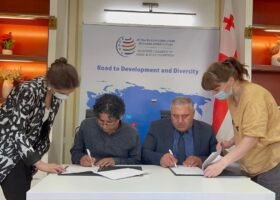Political and Economic Unity of Asian Countries-Goal and Future Challenges
Political and Economic Unity of Asian Countries-Goal and Future Challenges
- January 20, 2022
- Posted by: Kati2022

Introduction
Asia, as a continent with a rich historical and economic past, plays a major role in the political and economic processes of the twenty-first century, but its future potential is even greater. Countries on the continent include both the largest industrial and technological centers, such as China, Japan, and Asia, as a continent with a rich historical and economic past, plays a major role in the political and economic processes of the twenty-first century, but its potential is even greater. Countries on the continent include both the largest industrial and technological centers, such as China, Japan, and South Korea, as well as countries that have a potentially vast market and an available source of labor. Examples of such countries are India, Pakistan, and Bangladesh. The most important sources of energy for the world economy – the Persian Gulf countries are also located in Asia, and as a result of economic diversification, the United Arab Emirates, especially the Emirate of Dubai, has become a major player in the banking and financial sectors. Due to the economic potential and the resulting political influence, political rapprochement between Asian countries and their presence in the global political arena could be an important source for finding alternative solutions to several global problems and developing new world economies. This adds to the importance of existing and future political rapprochement between Asian countries.
The purpose of this article is to review current and global issues from the perspective of the Asian continent. The reason is clear: Georgia is a country that belongs to both Europe and Asia. Georgia has a consistent, stated official position on Europe and the United States, and has not yet fully realized the potential for relations with Asian countries, for objective and subjective reasons. Asian countries today face several global problems, such as conflict, terrorism, economic problems and others, the resolution of which is crucial to the realization of their economic and political potential. The topics of this post are primarily an overview of the economic and peace challenges of the Asian continent, ways to solve them and historical precedents, since the best way to solve problems is to explore them in time, discuss them and find the appropriate solution as quickly as possible.
Situation and challenges of Asian countries
The contrast between the countries of Asia is very great, the continent includes the countries, which occupy a prominent place in the lists or tables of various economic indices and thus represent the world’s leading economic powers; these countries are China, Japan, and India. On the other side of the same continent are countries such as Afghanistan, Cambodia, and Nepal.
Most countries in Southwest Asia are middle-income – except the Gulf States of Israel and Persia. North and Central Asian countries are among the low-income countries (excluding Russia). Some parts of South Asia are also considered low-income countries, and the inequality between them is gradually increasing. It is interesting, what could have caused such a big difference in the level of development on the same continent? The answer is multifaceted and, in some cases, vague. Maybe we connect it with culture, religion, traditions. This is why I will go back to the economy. In the second half of the twentieth century, each country chose a different economic development path. Some are socialist, others are capitalist. For comparison, a clear example of this is North and South Korea. Capitalist South Korea has achieved great success. China, because of Dan Xiaoping’s reforms, transformed the economy and moved to a largely capitalist economic model, albeit with some retention of the role of the state.
Are there any ways to resolve the conflict other than armed conflict?
Resolving conflicts in the Asian region is quite a difficult task and each of these conflicts is the subject of a multi-page paper. A clear example of this is the Iran-US conflict in the Persian Gulf, which is very difficult to resolve due to the ideological differences between the two countries and conflicting geopolitical interests. Nevertheless, a historic event occurred under the Barack Obama administration – a nuclear weapons agreement was signed between Iran and the United States, which, for some reason, failed to bring effective results. This is partly because of the change of administration in the US and the radical views of President Donald Trump. Now, under Joe Biden, talks resumed on a new nuclear deal. It is important to note the 25-year cooperation agreement between Iran and China, which aims to strengthen economic and political ties. So is the fact that China has responded critically to US sanctions on Iran.[1] An important issue is that of Afghanistan, which will be discussed in more detail below. The Armenian-Azerbaijani conflict is also important. The Nagorno-Karabakh war between Azerbaijan and Armenia lasted for 30 years and ended in 2020. Due to its economic advantages, Azerbaijan was able to regain control of a large part of the territory, which is internationally recognized as part of it, although after the first Karabakh war it was under the control of the Armenian side. The conflict is not over due to the issue of Syunik (historical Zangezur) and other factors. The international community is actively discussing solutions that can bring stability and peace to the region. This is preceded by dialogue and a focus on peace, and the belief that both sides must recognize each other as an equal and legitimate force. We may be skeptical of dialogue at such times, but anything is possible in international politics. An example of this is the situation in Afghanistan, where after US forces left the country, the Taliban managed to seize power with lightning speed. Today, the international community speaks openly about dialogue with them.
Therefore, Armenia and Azerbaijan should open a dialogue. You will often come across articles in the Azerbaijani and Turkish media that talk about Azerbaijan’s hospitality, tolerance, and acceptance of foreigners, while indirectly referring to Armenia. This can be perceived as their desire to normalize relations with Armenia. It is necessary to forget the historical grievances, an example of which is given by European states. The first steps in rebuilding trust can be bilateral visits by students, NGOs, and celebrities to help create common ground. It is also important to bring cultural rapprochement, find common historical features and talk about them openly through various activities and direct initiatives.
Of course, there is no one-way to resolve conflicts and wars, because wars and conflicts have different causes and all of them require an individual approach. However, there are different ways of achieving a goal that is historically experienced, important, and goal-oriented. These are – international mediation, assistance to international and regional organizations, and the establishment of economic ties in which the main role is played by various non-governmental and non-commercial economic organizations and entities. A rather important conflict is the Israeli-Palestinian conflict, which is a multi-layered phenomenon and is only being resolved through their militaries. Israel and Palestine are very different in terms of resources, as well as their military strategies. Consequently, armed conflict will bring nothing but constant tension. The only solution is to continue dialogue. The potential for such relations existed in the past – during the reigns of Yasser Arafat and Yitzhak Rabin. They supported the ideas of the International Peace Conference and dialogue between the Government of Israel and the representatives of the Palestinian people. They were allowing the Palestinian people to engage in dialogue. Consequently, it can be said that the idea of resolving the Israeli-Palestinian conflict through dialogue is realistic, although it is confronted with problems such as radicalism in society on both sides and religious or nationalist populism, which is quite entrenched in both sides.
Mediation
There are many examples of successful mediation in the world, which means that it is not impossible to achieve this in the Asian region. A successful example of mediation in the Asian region can be considered. Albeit a small but important recent issue between Armenia and Azerbaijan, which involved the exchange of captives through Georgian mediation, was accomplished in the summer of 2021. Therefore, it can be said that in similar conflicts, it is possible and realistic to solve various problems with the help of Georgia or other neutral countries.
Organizations
What is the role of regional organizations in the process of conflict prevention and resolution? In the era of globalization, it seems that international organizations are taking on more and more responsibility in resolving conflicts. For example, the UN openly states its role in resolving various international conflicts. In addition, a positive development can be seen in the fact that the Association of Southeast Asian Nations (ASEAN) is eager to play the role of peacemaker within the continent. Our Business Chamber must cooperate with organizations united for similar purposes. For objectivity, it should also be noted that the involvement of international organizations is not always effective for a variety of reasons. These reasons may be differences in values - there are political differences in regional organizations. Often religious, ethnic, and cultural characteristics are major barriers to such relationships. It is also important to note that quite often, due to the fact that international organizations do not have the effective leverage to convince individual countries of the effectiveness of their recommendations, the latter’s ability to effectively resolve this or that conflict weakens considerably. These problems can be solved, and smaller organizations affiliated with large international organizations and other independent entities are working quite actively for this. For example, EU Youth Projects (ERASMUS +) allow young people from all over the world to get to know each other, share their culture, traditions and national characteristics with foreigners, which significantly breaks down the above-mentioned barriers. Such projects are even more important in a region of Asia that is nationally, culturally, or ethnically very diverse. One of the important directions of the Business Chamber of Asian and Gulf Countries is a youth project called “Educated Young People for Successful Business”. Economic interests are an important motivator on the path of development. Therefore, this project will bring young people closer to the region and increase their interest in each other. Our organization will be able to achieve this goal with the help of other international organizations (USAID, GIZ, EBRD) through educational and investment programs.
A similar project is the Spring on the Silk Road Festival, scheduled for March 21, 2022, organized by the Business Chamber of Asian & Gulf Countries. Officials from Asian countries’ embassies will attend the festival. The event will allow representatives of the states to present their culture, characteristics, economic potential, share plans and opportunities for cooperation between countries. The festival will help popularize and increase Georgia’s tourism potential. After all, tourism is the best way for relations and integration between countries. As the saying goes – “Each person is an ambassador of his own country.” The promotion of tourism is an important precondition for the development of economic and diplomatic relations for business representatives. This festival presents a new, unique idea and project, which aims to promote rapprochement between Asian countries, establish and expand close relations and introduce each other to the culture, economy, and general characteristics of different countries. These and other similar measures are the first steps in resolving conflicts or tensions in the region.
Economic
China tops the list of world exporters. The main trading partners for China are Japan, South Korea, Vietnam, Malaysia, Singapore, the Philippines, and Indonesia. In addition to being one of the largest exporters in the world, China’s role in the import balance of many countries is very large. Trade relations are an important part of the bilateral union of these countries, and it is the greatest motivation for these countries to maintain healthy diplomatic relations with each other. It is also interesting to note that the United States and China have been fighting for leadership for a long time. Nevertheless, no country is willing to jeopardize diplomatic relations between them; The reason is simple – it is very cheap for America to manufacture its products in China – be it Apple, Tyson, Palmolive, or Avon. For China, the loss of large investments by ruining relations will be catastrophically unprofitable. This is one of the simplest examples of why it is necessary to expand international trade and economic relations between countries.
The Afghanistan Issue – An Endless Problem or New Opportunities?
The United States ended its 20-year war in Afghanistan, after which the Taliban quickly regained control. This, in some circles, has caused serious frustration, with trillions of dollars being spent on democratizing Afghanistan, equipping the armed forces, and developing political processes, but it has been impossible to achieve the desired result. Moreover, the mentioned side surrendered to the opponent without a fight. What does this mean for the future? Is the loss of gains from many years of work a sign that US policy in Afghanistan has flaws that ultimately made it impossible for the Afghan government and state apparatus to function without US support?
Indeed, the United States and its allies have left Afghanistan, and the Taliban’s victory has come as a great disappointment to many Afghans and foreigners alike. However, the formation of a new government in the country, the actions of the Taliban, and the reaction of the international community may significantly change the economic and humanitarian situation, if both the Taliban government and the international community show the necessary political will.
Despite this difficult situation, it is difficult to make optimistic predictions, but the only way, again and again, is to think rationally and find a solution. It can be said with certainty that the only solution is to anticipate the future and perceive issues globally. We can call this “dialogue and development.”
This topic is an important topic of discussion for politicians in different countries. Some of them think that the first step should be to impose sanctions on Afghanistan. Although this is a fairly effective method of peaceful “punishment,” in such cases the most pressure still falls on the poor. Authorities continue to act arbitrarily and irrationally. At the same time, the effectiveness of sanctions is greatly diminished by the emergence of Russia, China, India and other emerging markets, which maintain significant independence from the Western economic system. This allows countries facing sanctions to find alternative economic partners. This, in turn, also allows the political existence of the governments of these countries to continue. In countries like China or India, the West can not easily impose sanctions for violating the same sanctions against Afghanistan or Iran, because it will greatly hurt itself. Therefore, the effectiveness of sanctions can also be assessed quite skeptically. The second way is to start a dialogue again and again. It is very difficult for the Western European states and the US to establish direct peaceful diplomatic relations with the Taliban in the first place. It is almost impossible due to the political and ideological contexts of these countries, but there are various ways to avoid these obstacles, such as mediation, international and regional organizations.
Indeed, as much as Asia is an interesting, diverse and multifaceted rich region, it is also extreme, delicate and dangerous. This continent has, unfortunately, witnessed many humanitarian or economic crises both in the past and in the present and, unfortunately, this will continue in the future. While much of the responsibility for Afghanistan, for example, lies with the Taliban, the United States, other international partners, and regional organizations also have great responsibility. Each seemingly insignificant decision may bring the worst results for each country, as well as for the region as a whole or the world.
It can be said that the problems and conflicts listed above in the Asian region are quite remarkable. Focusing on the problem is the only way to find a solution. The main problem in Asia today is humanitarian crises – armed conflicts, epidemics, famines, natural disasters, and more. Specifically, this includes the humanitarian crises in Afghanistan and Yemen, the internal conflict in Myanmar, the Nagorno-Karabakh conflict, the crises in Syria and Lebanon, and so on. The only solution to these problems is mediation, economic support, and unity in the region. If all this seems unbelievable to you, be sure to recall the difficult situation in Europe after the Second World War and the very-soon-revived continent with mutual support. With a common goal and desire, the Middle East and Asia also have the potential to create a similar unity such as the EU. The EU today is a place where accumulated resources and knowledge are shared without hindrance. Young people from EU member states can study, travel or work free in neighboring countries, but at the same time to not lose their identity and individuality. Although the EU is a result of globalization, each country has its language, identity, culture, religion, and other characteristics. That is why these countries are attractive and interesting to the whole world. Creating such unity in our region is necessary and inevitable.
Author: David Tsirdava
[1] https://www.radiotavisupleba.ge/a/31655748.html?fbclid=IwAR0XOjOG43r_ys_GTza0O3_-2eDtmvd9G2qjf2FDzjQ3pH-KGpVP3ZtABd4



























